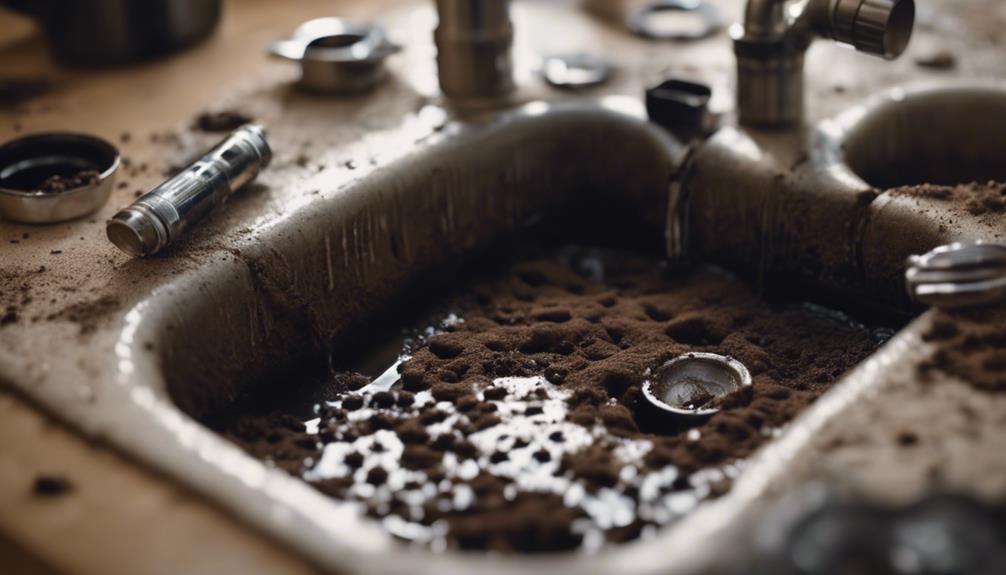Dumping espresso grounds down the drain can be hazardous. The grounds can clump together and clog pipes, causing blockages. Plumbers recommend against using this method of disposal. If you experience clogs due to built-up grounds, you may need professional assistance to fix the issue. To prevent problems, it is best to refrain from using the garbage disposal for espresso grounds. If you are interested in learning more about the effects and correct disposal methods, there is valuable information available.
Key Takeaways
- Espresso grounds should not go down the drain to prevent clogs.
- Grounds clump together, causing pipe blockages and slow drainage.
- Plumbers advise against disposing of espresso grounds in sinks.
- Proper disposal methods include composting or sealing for trash.
- Avoid harm to waterways and wildlife by disposing of grounds responsibly.
Potential Risks of Espresso Grounds
If you pour espresso grounds down the drain, you risk causing potential clogs and blockages in your plumbing system. Espresso grounds, much like coffee grounds, have the tendency to clump together, creating obstructions in your sink drains. Plumbers advise against disposing of espresso grounds in this manner to avoid encountering plumbing issues.
The accumulation of these grounds over time can lead to troublesome blockages that may require professional intervention to resolve. To prevent these complications, it's recommended to refrain from using your garbage disposal for espresso grounds as well.
Proper disposal methods such as throwing espresso grounds in the garbage can or compost are more suitable alternatives. By choosing to discard your espresso grounds in this manner, you can significantly reduce the risk of experiencing clogs and blockages in your plumbing system.
Plumbing Issues and Clog Formation
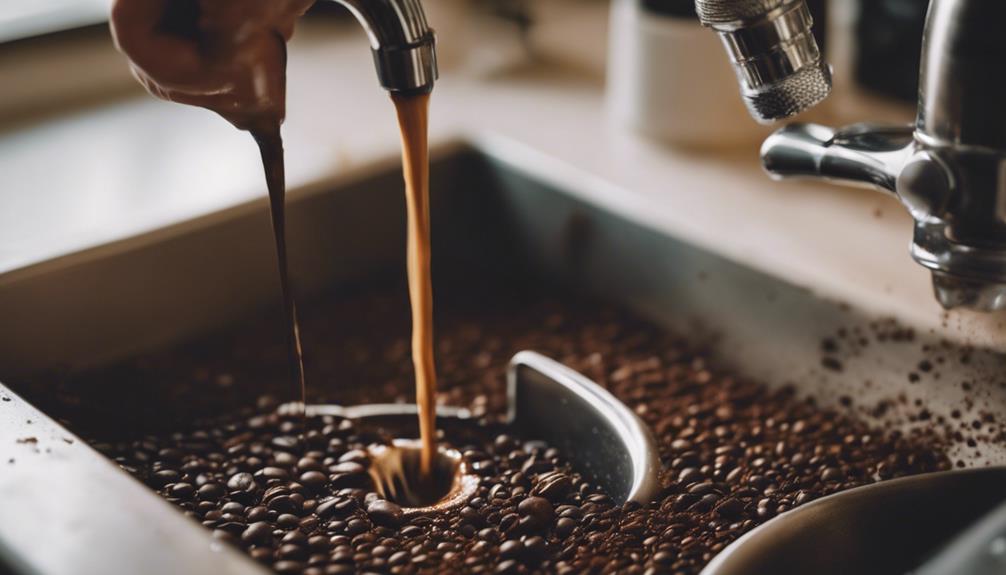
Espresso grounds and coffee grounds have a tendency to clump together, potentially leading to drain clogs and plumbing issues. When espresso grounds go down the drain, they can accumulate over time, causing a clogged drain and hindering proper water flow.
Here are some key points to keep in mind regarding plumbing issues and clog formation:
- Clumping: Espresso grounds tend to stick together, creating blockages in the pipes.
- Slow Drainage: The buildup of grounds can result in slow drainage, indicating the early stages of a potential clog.
- Blockages: Continued disposal of grounds down the drain can lead to significant blockages, requiring professional intervention to resolve.
- Plumber Recommendations: Plumbers advise against putting espresso grounds down the drain to prevent clogs and maintain the integrity of your plumbing system.
To avoid clogged drains and plumbing issues, it's best to dispose of espresso grounds through alternative methods like composting or throwing them in the garbage. Taking these precautions can help you keep your plumbing functioning efficiently.
Alternative Disposal Methods
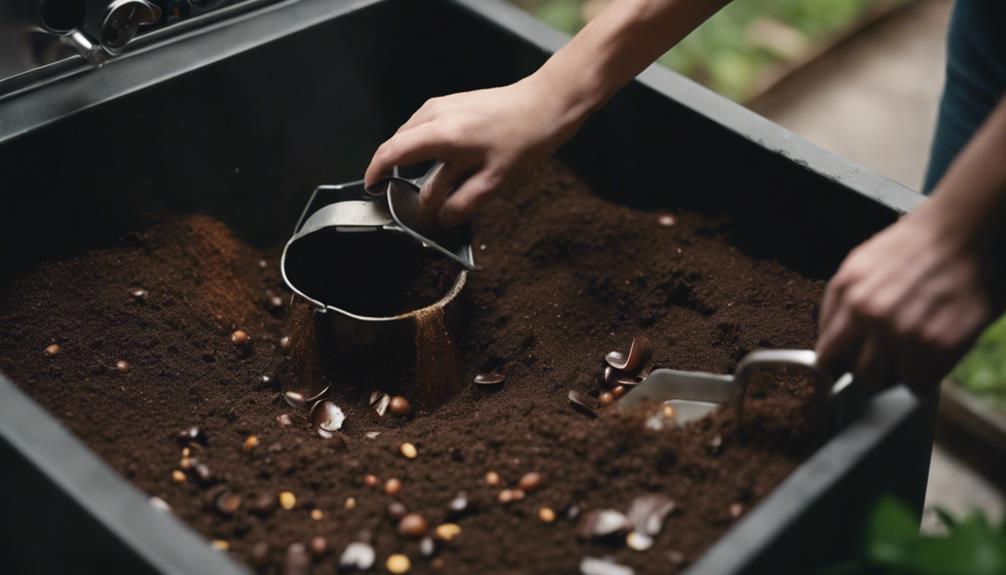
Consider composting or sealing espresso grounds in a bag before disposal to prevent plumbing issues and promote eco-friendly waste management.
Composting espresso grounds is an excellent way to repurpose them as fertilizer for your garden. When putting coffee grounds in your compost, they add essential nutrients like nitrogen that help enrich the soil and promote plant growth.
By composting espresso grounds, you not only avoid potential drain clogs but also contribute to sustainable waste management practices. Additionally, sealing the grounds in a bag before throwing them away guarantees they won't end up causing plumbing problems.
This method of disposal is simple and effective, reducing the risk of blockages in your pipes. Remember to always utilize designated waste disposal methods for espresso grounds to prevent any environmental harm and keep your plumbing in good condition.
Environmental Impact of Dumping Grounds
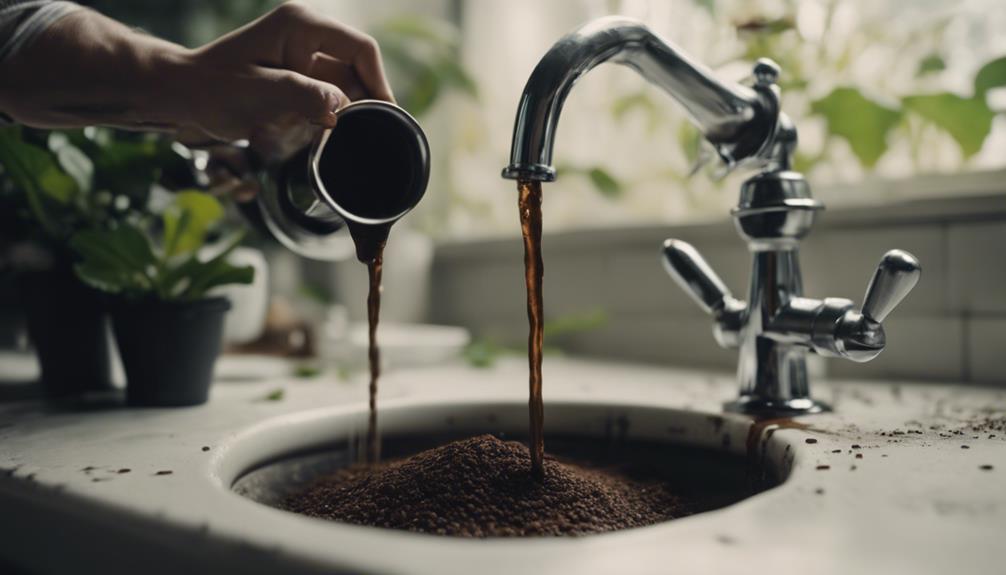
Dumping espresso grounds down the drain can harm waterways by contributing to blockages and affecting the ecosystem.
Soil contamination risk increases when espresso grounds accumulate in pipes, potentially leaching harmful substances.
Wildlife may suffer from ingestion or entanglement with disposed espresso grounds, highlighting the importance of proper disposal methods.
Impact on Waterways
Pouring espresso grounds down the drain can have a detrimental impact on waterways, especially when it comes to nutrient pollution. Here are some key points to take into account:
- Nutrient Pollution: Coffee grounds dumped in the drain introduce excess nutrients like nitrogen and phosphorus into waterways.
- Algae Growth: These nutrients can lead to algae blooms, which deplete oxygen levels in the water, harming aquatic life.
- Organic Matter: The organic content in coffee grounds can decompose in water, impacting the overall water quality.
- pH Levels: The acidity of coffee grounds can alter the pH levels in water, disrupting the balance necessary for aquatic ecosystems.
Soil Contamination Risk
When espresso grounds are discarded inappropriately, they pose a significant risk of soil contamination due to their high levels of heavy metals. Grounds contain substances such as copper and zinc, which can accumulate in the soil over time. The accumulation of these heavy metals can hinder plant growth and disrupt the natural balance of the ecosystem. Soil contamination from dumping grounds down the sink can have lasting environmental consequences, impacting not only plants but also the organisms that rely on the soil for sustenance. Proper disposal methods, such as composting, offer a more sustainable approach that reduces the risk of soil contamination. By composting espresso grounds instead of disposing of them in the drain, you can help protect the soil from harmful pollutants and contribute to a healthier environment.
| Soil Contamination Risk |
|---|
| High levels of heavy metals |
| Accumulation in soil |
| Impaired plant growth |
| Environmental harm |
Wildlife Harm Potential
Improperly disposing of espresso grounds can pose a significant threat to wildlife by altering pH levels and contaminating water sources, potentially harming aquatic organisms. When espresso grounds are dumped down the sink drain, they can have detrimental effects on the environment. Here's how this can impact wildlife:
- Altered pH Levels: Coffee grounds can change the pH of water, making it unsuitable for many aquatic species.
- Toxic Compounds: Compounds like caffeine in coffee grounds are toxic to aquatic organisms, endangering their health.
- Ecosystem Disruption: Improper disposal disrupts ecosystems, affecting the balance of aquatic life.
- Ingestion Risks: Wildlife may mistakenly ingest coffee grounds, leading to potential harm or even death.
Tips for Proper Disposal of Espresso Grounds
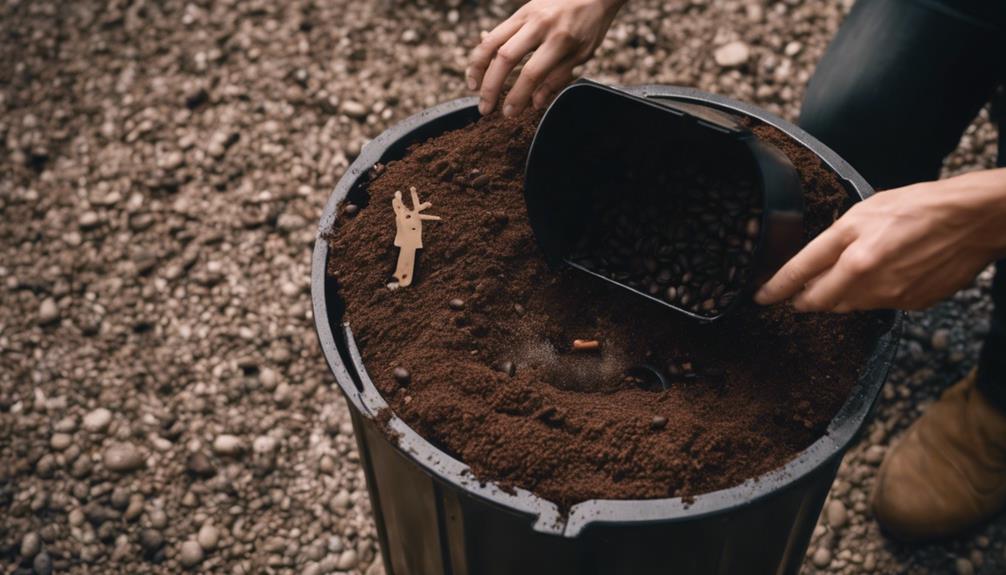
To properly dispose of espresso grounds, consider composting them to enhance plant growth and avoid potential drain clogs. Unlike coffee grounds, which can accumulate in the kitchen sink and lead to plumbing issues, espresso grounds should be kept out of the drain altogether.
By composting your espresso grounds, you not only prevent clogs but also create a nutrient-rich soil amendment that benefits your plants.
When composting espresso grounds, mix them with other organic materials like vegetable scraps, yard waste, and paper to create a balanced compost pile. This process helps break down the grounds and other components into a valuable soil conditioner.
Additionally, you can use the compost in your garden to improve soil quality, retain moisture, and reduce the need for chemical fertilizers.
Conclusion and Final Thoughts
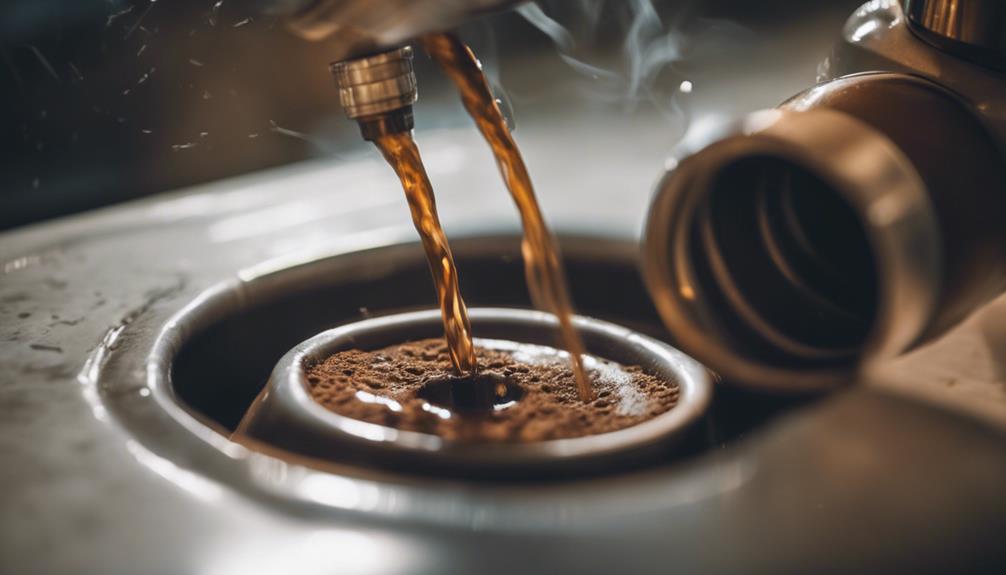
Consider composting or throwing away your espresso grounds responsibly to prevent drain clogs and maintain a healthy plumbing system. When it comes to disposing of espresso grounds, it's essential to be mindful of how you handle them to avoid potential issues down the line. Here are some final thoughts to keep in mind:
- Coffee Grounds Go Down the Sink:
While it may seem convenient to wash espresso grounds down the drain, they can clump together and create blockages that lead to drainage problems over time.
- Proper Disposal Methods:
Opt for composting or throwing espresso grounds in the trash to prevent clogs and maintain a smooth-flowing plumbing system.
- Avoid Drainage Issues:
By refraining from putting espresso grounds down the sink, you can steer clear of costly plumbing repairs and keep your pipes clear of obstructions.
- Responsibility is Key:
Taking responsibility for how you dispose of espresso grounds can contribute to the longevity and efficiency of your plumbing infrastructure.
Frequently Asked Questions
Can Espresso Grounds Go Down the Drain?
Espresso grounds shouldn't go down the drain. They can clump together, leading to blockages in your pipes. Plumbers recommend avoiding this to prevent potential plumbing issues.
Proper disposal methods for espresso grounds include composting or using them in gardening. Remember, incorrect disposal of espresso grounds can cause clogs and drainage problems. Be mindful of how you dispose of them to keep your plumbing in good shape.
How Do You Dispose of Espresso Coffee Ground?
When disposing of espresso coffee grounds, avoid the drain to prevent plumbing problems. Instead, opt for eco-friendly solutions like composting or throwing them in the garbage.
Espresso grounds can clump together, causing pipe blockages. Prioritize proper disposal methods to keep your plumbing system running smoothly. Remember, it's best to steer clear of the drain when it comes to getting rid of espresso grounds.
Is It Okay to Throw Coffee Grounds Down the Garbage Disposal?
Throwing coffee grounds down the garbage disposal isn't recommended. Coffee grounds can clump together, leading to clogs and potential blockages.
Garbage disposals may struggle to break down the grounds, causing issues. Proper disposal methods like composting or throwing them in the trash are better options.
Avoiding coffee grounds in the disposal can prevent odors, malfunctions, and costly plumbing problems.
How to Dispose of Coffee Grounds From a Cafetière?
When disposing of coffee grounds from a cafetière, remember not to pour large amounts down the sink to prevent clogs. Instead, run water while getting rid of the grounds to help them flow through the pipes smoothly.
Composting cafetière coffee grounds is an eco-friendly option since they're biodegradable and break down in water over time. Consider this method to reduce waste and benefit the environment.
Can Using Espresso Grounds Down the Drain Affect Its Benefits?
Pouring espresso grounds down the drain can clog the pipes and affect the benefits of espresso. It’s better to compost the grounds or use them in your garden to enrich the soil and enhance the benefits of espresso for your plants.
Conclusion
In short, pouring espresso grounds down the drain may seem harmless at first, but the potential risks of clogs and plumbing issues aren't worth the convenience.
It's best to find alternative disposal methods, such as composting or using them in your garden, to avoid any environmental impact.
By taking a few extra steps to properly dispose of your grounds, you can guarantee a smooth drain and a cleaner environment.
